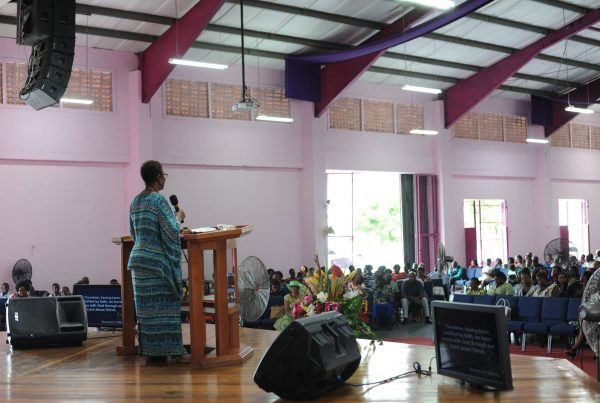A certain woman of the wives of the sons of the prophets cried out to Elisha, saying, “Your servant my husband is dead, and you know that your servant feared the Lord. And the creditor is coming to take my two sons to be his slaves.” 2 So Elisha said to her, “What shall I do for you? Tell me, what do you have in the house?” And she said, “Your maidservant has nothing in the house but a jar of oil.” 3 Then he said, “Go, borrow vessels from everywhere, from all your neighbors—empty vessels; do not gather just a few. 4 And when you have come in, you shall shut the door behind you and your sons; then pour it into all those vessels, and set aside the full ones.” 5 So she went from him and shut the door behind her and her sons, who brought the vessels to her; and she poured it out. 6 Now it came to pass, when the vessels were full, that she said to her son, “Bring me another vessel.” And he said to her, “There is not another vessel.” So the oil ceased. 7 Then she came and told the man of God. And he said, “Go, sell the oil and pay your debt; and you and your sons live on the rest.” 2 Kings 4:1-7
What do you have in your house? The woman in 2 Kings 4 had various concerns. She had physical, social, spiritual and financial concerns. Her husband was dead and she lost the relationship and the time that she had with him. Then her sons were going to be taken away to be slaves. Her social linkages were broken. The woman expressed her spiritual concern to Elisha. Her husband was a servant, a prophet, a man of God. She identified her husband as one who feared the Lord. She had an emotional concern because of the lost of her husband. She was grieving for him, she was in pain. She asked the question to Elisha, “what are you going to do about it?”. Elisha listened to her concerns as she continued to express that her financial issues were becoming too difficult. She was unable to pay her bills, she didn’t have any money and her sons were going to be taken away by the creditors. These are all real concerns expressed by a real woman that any of us can experience today.
After she expressed her concerns, Elisha challenged her. He asked her ‘what shall I do for you?’, then he asked ‘what do you have in your house?’. Elisha wasn’t asking her about the things in her house like furniture and clothes. He asked her about the things that can generate finance. He didn’t ask what someone else had in their house but what she had in her house. She was looking around at others and not in her own house. After Elisha recommended to her some sensible questions. Elisha wanted to hear from the woman herself what she had in her house. He wanted her to speak it. Her response to Elisha was first negative but then she realized what she had, she had a jar of oil. She had to verbalize it. After verbalizing it, she had to value it.
God has given us something valuable and we need to appreciate it. We have to value what God has given us and not look at what other people have. We have to value our gifts. We have to have a vision for what we have. What can we do with the oil? What can we do with the things that God has deposited within us? Elisha then gave her instructions. He told her to borrow from everywhere, to borrow from her neighbours, to empty the vessels and not to gather a few. He was telling her to have a vision for the oil.
We also have to be vigilant with what God has given to us. It has nothing to do with our friends or our neighbours. We have to shut the door behind us and our families. We have to shut out certain people who are curious and who delight in discouraging us. We have to also shut out the covetous people whose motive is to steal ideas.
We have to be victorious with what we have. We have to allow our faith to come alive on the inside. The woman walked in faith as she went forth and did what Elisha commanded. Be victorious and give thanks for what God has given.
In verse 6, the woman verified what she had. We have to verify what we have. The potential that the oil had, reached its limit. Everything that she had, reached to its fullest. After she returned to Elisha and he told her to sell the oil, pay her debt and live on the rest. She now had enough resources to live on for the rest of her life. She gave God some, saved some, invested some and enjoyed some.
Elisha didn’t lay hands on her instead he asked a question that was relevant for the situation. He didn’t help her to collect the vessels but instead she used what she had. What do you have in your house? The key to her problem was inside her house. What has God given to you that you are not using? What talent has God given that you are not using? Are you cherishing it or are you looking at someone else? We have to take our eyes from outside and look on the inside and value it. We have to get up and give God thanks for what He has given us. We have to value it and develop it for the glory of God.



